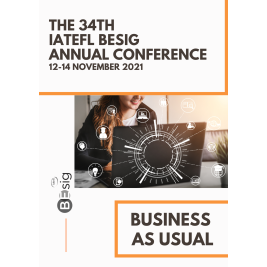 The IATEFL BESIG conference 2021 took place from November 12th to 14th. This was both the second time that it has been online and the second one that I have attended. The title of this year’s event was “Business as Usual” and the main theme running through the conference was the question “What does business as usual look like to you?”
The IATEFL BESIG conference 2021 took place from November 12th to 14th. This was both the second time that it has been online and the second one that I have attended. The title of this year’s event was “Business as Usual” and the main theme running through the conference was the question “What does business as usual look like to you?”
With just under 50 speakers over 3 days, I couldn’t begin to encompass in this blog all the talks and workshops that took place, but here is a brief summary of some of my favourites.
Keynote Talk: Business English- A Retrospective and Manifesto by Evan Frendo
Evan’s keynote talk at IATEFL BESIG conference 2021, inspired by the agile practice of doing retrospectives at the end of an iteration, was a whirlwind tour through the key aspects of business English as a discipline today. Some of my many takeaways were:
- Business English is taught by a huge range of people in many different contexts, from working as part of a team in-house to freelancers, from executive to low resource contexts.
- How do we share information and become better informed about our specialization, especially when research can be hard to access? Blogs, especially summaries of lectures, talks etc are excellent resources but tend to be transitory in nature. We need to be generous about sharing our ideas with each other.
- Exactly what business English is and how it should be taught are hard to pin down and ideas about it are continuing to develop. For example, it can be better to think of BELF as English as a lingua franca, where the domain rather than the type of English is emphasized.
- Our students must often speak English in highly specific communities of practice (often with language and terminology that are unknown to us) and with TIGs (transient international groups). Research shows that students learn best by using and experiencing English within these communities rather than in a traditional classroom, and we must utilize this, along with translanguaging, to prepare them for their work.
- Material developers, whether they be publishers or teachers themselves, need to focus on what is probable rather than what is possible when choosing language to be taught. What language will students actually need and encounter?
- Our teaching must not only be learner-centred but also learning-centred, meaning that it is important that we not only focus on what language the learner needs to learn, but also the learning theory we utilize and underpins our teaching.
The above points only really scraped the surface of the talk. For me it was really more of a jumping off point for more research and personal enquiry. Evan’s talks are always well researched and he provided many useful references that I can use to dig deeper into his ideas, which I am very much looking forward to doing afer the IATEFL BESIG Conference 2021.
A Case for the online blended Case Method by Vicky Magari
Vicky’s talk focused on the case method and how it can be used in an online environment. She included the rationale for this approach, its advantages and drawbacks. Furthermore, she described how to use online tools to create a seamless framework and lesson plan that includes synchronous and asynchronous activities. Although I use case studies in my teaching, I have never encountered it as an explicit method before, and Vicky’s talk was very well researched and informative. Therefore I found this session really interesting.
Gamification of task-based learning by Andreea-Katia Nechifor
As the title stated, Andreea’s talk looked at how to utilize gamification in task-based learning, and specifically how to adapt it to an online environment. She briefly went through the academic background of task-based learning, such as the various definitions of a task and the four types of tasks: real-world tasks, pedagogic tasks, unfocused tasks, and focused tasks. Then she presented a task cycle for each type with an example of an online gamified task, including a board game and bingo game. Additionally, she shared two online resources that she uses for gamification, genial.ly and flippety.
As always, the IATEFEL BESIG conference 2021 was a great chance to connect with other business English teachers and catch up with people, especially those from further afield who might not be able to attend the conference if it had taken place in person. It will be interesting to see in upcoming years to what extent the online format will really be “business as usual”. With new variants emerging and travel restrictions being introduced, we will just have to wait and see.

